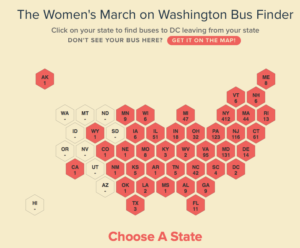On January 21, the Women’s March made plenty of headlines with big crowds at events around the world. Satellite marches popped up in more than 500 cities, but the main event was in the nation’s capital. The Women’s March organizers operated in grassroots fashion, but one piece of the preparation felt decidedly more professional: the travel assistance for attendees.
The Women’s March website included a Bus Finder section that gave online users the ability to browse for potential bus options and contact the local organizers to secure a seat on a ride to Washington, D.C. For leaders in charge of coordinating regional shuttle service, a simple Google Doc allowed them to input all essential information such as departure date, departure time and pick-up location. It seems that helping attendees find rides worked; city officials estimated that over 500,000 people attended the rally.


Can Regional Transit Options Help Your Registration Numbers?
Event professionals who are looking to make their attendees’ lives easier may be able to apply lessons from the Women’s March transit finder service to their own conferences and meetings. Consider all the costs associated with getting to a conference. Whether an attendee flies and takes a cab from the airport or drives and parks a car in an expensive downtown lot, travel includes plenty of expenses and hassles. Imagine how much happier budget-conscious attendees might be if they could eliminate some of those additional headaches.
Wait, some organizers will say, does this mean that my organization is supposed to coordinate dozens of bus routes? Definitely not. Instead, many organizations can leverage their regional chapter structures to delegate this responsibility to local leaders, and there is a new bus-sharing service that can handle the majority of the logistics. It’s called Skedaddle, and it played a big role in bringing attendees to the Women’s March. Before the event, its founders told The New York Times that Skedaddle planned to transport approximately 11,000 riders to the nation’s capital. I browsed the company’s website, and I was impressed by how easy it is to arrange a bus for a small group.
For example, I experimented with arranging a bus from Chicago to Indianapolis for a three-day stay. The first nine riders would pay approximately $90 for a round-trip ticket, and additional riders would pay slightly more. The company also offers a private route option, which allows an organization to pay for a portion of the overall cost. Outside of costs, this type of service seems like a prime opportunity for additional networking.
Do you think your attendees would take advantage of a bus service to your conference? Share your thoughts in the comments section below. You can also learn more about Skedaddle in this Fortune article.

